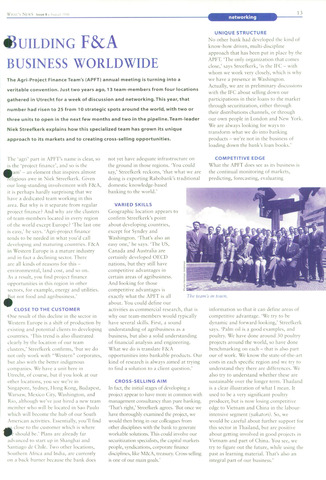^Building F&A
BUSINESS WORLDWIDE
WHAT'S NewS Issue 8 August 1996
networking
13
The Agri-Project Finance Team's (APFT) annual meeting is turning into a
veritable convention. Just two years ago, 13 team-members from four locations
gathered in Utrecht for a week of discussion and networking.This year, that
number had risen to 25 from 10 strategie spots around the world, with two or
three units to open in the next few months and two in the pipeline.Team-leader
Niek Streefkerk explains how this specialized team has grown its unique
approach to its markets and to creating cross-selling opportunities.
The 'agri' part in APFT's name is clear, so
is the 'project finance', and so is the
Anm' - an element that inspires almost
religious awe in Niek Streefkerk. Given
our long-standing involvement with F&A,
it is perhaps hardly surprising that we
have a dedicated team working in this
area. But why is it separate from regular
project finance? And why are the clusters
of team-members located in every region
of the world except Europe? 'The last one
is easy,' he says. 'Agri-project finance
tends to be needed in what you'd call
developing and maturing countries. F&A
in Western Europe is a mature industry
and in fact a declining sector. There
are all kinds of reasons for this -
environmental, land cost, and so on.
As a result, you find project finance
opportunities in this region in other
sectors, for example, energy and Utilities,
^^it not food and agribusiness.'
CLOSE TO THE CUSTOMER
One result of this decline in the sector in
Western Europe is a shift of production by
existing and potential clients to developing
countries. 'This trend is also illustrated
clearly by the location of our team
clusters,' Streefkerk confirms, 'but we do
not only work with "Western" corporates,
but also with the better indigenous
companies. We have a unit here in
Utrecht, of course, but if you look at our
other locations, you see we're in
Singapore, Sydney, Flong Kong, Budapest,
Warsaw, Mexico City, Washington, and
Rio, although we've just hired a new team
member who will be located in Sao Paulo
which will become the hub of our South
American activities. Essentially, you'11 find
close to the customer which is where
should be.' Plans are already far
advanced to start up in Shanghai and
Santiago de Chile. Two other locations,
Southern Africa and India, are currently
on a back burner because the bank does
UNIQUE STRUCTURE
No other bank had developed the kind of
know-how driven, multi-discipline
approach that has been put in place by the
APFT. 'The only organization that comes
close,' says Streefkerk, 'is the 1FC - with
whom we work very closely, which is why
we have a presence in Washington.
Actually, we are in preliminary discussions
with the IFC about selling down our
participations in their loans to the market
through securitization, either through
their distributions channels, or through
our own people in London and New York.
We are always looking for ways to
transform what we do into banking
products - we're not in the business of
loading down the bank's loan books.'
VARIED SKILLS
Geographic location appears to
confirm Streefkerk's point
about developing countries,
except for Syndey and
Washington. 'That's also an
easy one,' he says. 'The US,
Canada and Australia are
certainly developed OECD
nations, but they still have
competitive advantages in
certain areas of agribusiness.
And looking for those
competitive advantages is
exactly what the APFT is all
about. You could define our
activities as commercial research, that is
why our team-members would typically
have several skills. First, a sound
understanding of agribusiness as a
business, but also a solid understanding
of financial analysis and engineering.
What we do is translate F&A
opportunities into bankable products. Our
kind of research is always aimed at trying
to find a solution to a cliënt question.'
CROSS-SELLING AIM
In fact, the initial stages of developing a
project appear to have more in common with
management consultancy than pure banking.
'That's right,' Streefkerk agrees. 'But once we
have thoroughly examined the project, we
would then bring in our colleagues from
other disciplines with the bank to generate
workable solutions. This could involve our
securitization specialists, the capital markets
people, syndications, corporate finance
disciplines, like M&A, treasury. Cross-selling
is one of our main goals.'
The team's in town.
information so that it can define areas of
competitive advantage. 'We try to be
dynamic and forward-looking,' Streefkerk
says. 'Palm oil is a good examples, and
poultry. We have done around 30 poultry
projects around the world, so have done
benchmarking on each - that is also part
our of work. We know the state-of-the-art
costs in each specific region and we try to
understand they there are differences. We
also try to understand whether these are
sustainable over the longer term. Thailand
is a clear illustration of what I mean. It
used to be a very significant poultry
producer, but is now losing competitive
edge to Vietnam and China in the labour-
intensive segment (yakatori). So, we
would be careful about further support for
this sector in Thailand, but are positive
about getting involved in good projects in
Vietnam and part of China. You see, we
try to figure out the future, while using the
past as learning material. That's also an
integral part of our business.'
not yet have adequate infrastructure on
the ground in those regions. 'You could
say,' Streefkerk reckons, 'that what we are
doing is exporting Rabobank's traditional
domestic knowledge-based
banking to the world.'
COMPETITIVE EDGE
What the APFT does see as its business is
the continual monitoring of markets,
predicting, forecasting, evaluating

